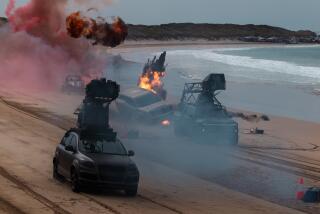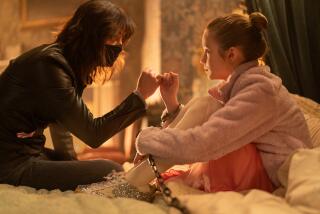A Hero Opens Our Eyes
It may generate more buzz than box office receipts, but the holiday release of the film “Hotel Rwanda” -- a heartbreaking look at the African nation’s 1994 genocide -- should be cheered for going against the grain of Christmas feel-good fare.
Critics may fret that its moral punch is undercut by a simplistic, somewhat sanitized view of the political upheaval and bloody killing spree. But had the film dared to graphically convey the depravity of the Hutu slaughter of Tutsis or explored the country’s complicated history, it would have been stuck on art house screens at best. Mass culture is obliged to simplify, to designate heroes, who provide the prism through which we can comfortably absorb both the grotesque and the grand.
In this movie, the real-life hero is more Everyman than Superman. Hotel manager Paul Rusesabagina -- a Hutu who reluctantly sheltered and then stepped up to save the lives of more than 1,000 Tutsi refugees -- makes the same journey of conscience required of viewers, from pragmatic self-interest to selfless moral reckoning. Along the way, he confronts an ugly truth that transcends the unfolding tragedy -- the world cares little for the fate of black Africans.
On the screen, the message is delivered by the chief of the United Nations peacekeeping force, who bitterly tells Rusesabagina that foreign soldiers will not be coming to save them because African lives are considered “worthless.”
Off the screen, a similarly chilling assessment of international indifference comes from Anthony Lake, who was President Clinton’s national security advisor during the crisis. Lake, who previewed the film with the New York Times, told the newspaper that the rampage -- 800,000 men, women and children slaughtered in three months -- failed to register on the radar screen of U.S. leaders preoccupied with conflicts in Bosnia and Haiti. Sudan is now similarly given short shrift as attention is riveted on Iraq.
But the United States did more than avert its eyes from Rwanda; this country turned its back. Not only did U.S. leaders not intervene, they demanded that the U.N. withdraw its peacekeepers, prohibited the use of the word “genocide” and ignored CIA warnings of the impending disaster.
In hindsight, Lake considers that “shameful.” His mind began changing when he visited a Rwandan churchyard months after the killing spree and found it so packed with the bodies of mutilated women and children he “couldn’t get out without stepping on them.”
Terry George, the movie’s director, hopes that “Hotel Rwanda” will provoke a similar public epiphany. A refugee from civil war in Northern Ireland, George fought to keep the project afloat amid skepticism in Hollywood. He kicked in money when financing lagged and took the rare step of challenging its initial R rating, winning a PG-13 without sacrificing anything. That will allow it to be screened for schools and community groups, an important step in lifting its heart-rending message from the back pages of history.
More to Read
Only good movies
Get the Indie Focus newsletter, Mark Olsen's weekly guide to the world of cinema.
You may occasionally receive promotional content from the Los Angeles Times.






